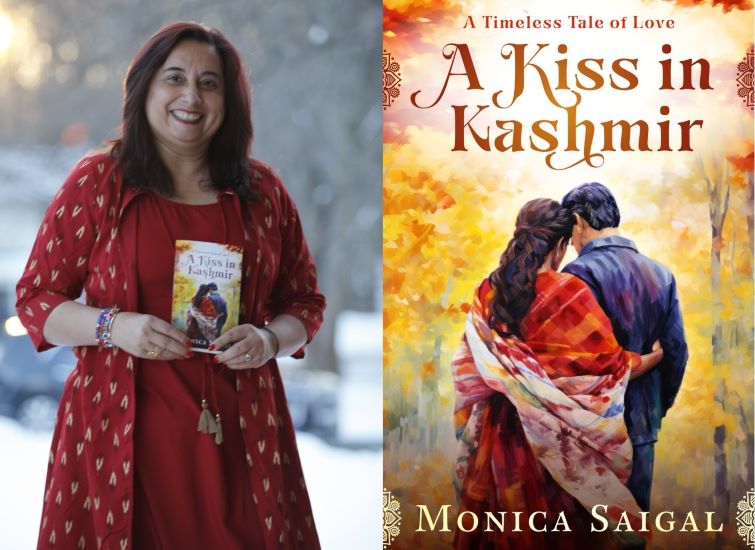Team L&M
Award-winning storyteller and food writer Monica Saigal, (formerly Monica Bhide) has unveiled her 12th book, A Kiss in Kashmir: A Timeless Tale of Love (Bodes Well Publishing, US). It is a touching story of love, loss, and second chances in the serene backdrop of Kashmir. Following is an excerpt from the book:
Chapter 8 (Page 81-84)
Sharmila tossed and turned that entire night. The mingling of the dance in the water along with the trip to the cemetery was all confusing, and her mind was filled with hope and expectation and refusal and chiding.
George had introduced her and Alina to Daneen’s welltended grave at the cemetery. At the gravestone, he placed red roses that he had purchased from a young girl at the gate and said softly, “I never thought I would see the day that I smile again, yet here I am. I know you’d want me to be okay.”
Alina looked at her mother to see Sharmila wiping away a tear. It had been an emotional day with Raahat and her mother, and now, meeting Daneen in this way. Alina reached over and placed her hand on George, who was on bended knee by Daneen’s grave.
His eyes still on the gravestone, George said, “Daneen, this is Alina. She is like a spark of joy personified. She is going to study to become a nurse, Daneen. I told you she is getting married, right? I spoke to him on the phone. What a nice young man. Emilio is studying law. Do you remember that I told you I am their tour guide? Yes, me. I guess this is my working retirement. And this, this is Sharmila. She is a talented artist. In fact, I think you and I may have even seen her work …” He became quiet.
Alina sat by George and held his hand. Sharmila began to pluck some of the petals from the red roses and spread them all over the grave.
Sharmila said, “Even though we never met, Daneen, I love that your memory has brought all of us here together.” Sharmila placed her hand on George’s shoulder. He reached up and squeezed it gently.
With that, they said goodbye to Daneen and left. Sharmila had often pondered whether anyone else experienced the ache of losing a companion as intensely as she did. Her time with Vikram had been incredibly brief—barely eighteen months—yet now she almost felt a pang of guilt for harboring sadness as she looked at George.
“I can’t imagine losing someone whom you’ve loved and lived with for an entire lifetime,” she’d said as they left the cemetery.
“I look at my life with her as a blessing. Maybe that’s the price one pays for love? Although it seems cruel to me that loving should have a price,” he replied.
That response kept her awake. Should love have a price to pay? That did seem rather cruel. In his life, and in so many ways, her own.
She was up at dawn and dealing with the restlessness the only way she knew how—she painted. Sharmila was glad she had purchased some small blank canvases and a set of paints. She had her set of brushes, and in her painting bag, she always kept the brush that Vikram had given her decades ago. It was the only thing of his she owned.
Sharmila set up the canvas on a small table by the window
She could see the Jhelum River in the distance and the sun rising over the top of the mountains. It was foggy outside, but the sun was doing its best to beat out the mist.
Sharmila began to paint the shy dawn with gentle brushstrokes. Yellow, orange, red—it seemed the colors poured from her soul more than her brush, each stroke bolder than the last one. As the sunrise unfurled, her brush became even bolder, gaining intensity that echoed the rising sun. She had always painted the valley from what Vikram had told her about Kashmir. It seemed surreal to be painting the scene while being there in person. She realized she viewed the valley differently from George. He loved it; she was in awe of it. He felt at home in it, and she felt welcomed. It was always so familiar to him, yet she felt surprised at each turn. She wondered if Vikram had ever seen the sunrise over the Jhelum in October. Had George?
The small painting was complete, barring one thing. She needed to sign it.
She inscribed her artwork, as she had for decades, with a single word, Rumshaya. This was an homage to the enigmatic figure Shams, who inspired the great Rumi himself. She never signed her true name, treasuring her privacy deeply. This silent tribute brought her profound comfort and was her way of connecting with and honoring two of her greatest spiritual teachers.
She hoped this painting, like her others, would offer the viewer serenity and fulfillment.
She stared at Rumshaya. She intended it as a heartfelt blessing upon the canvas and anyone who beheld, cherished, or took it into their lives.
She wondered what George would think of her art. He had seen the photos of it earlier at the shrine and said he was impressed, but she was worried he was just being polite. Then her anxious mind did what it did best—it ran in several conflicting directions. She was here to plan for Alina’s wedding, and Sharmila knew that was the right thing to do, yet found herself thinking of George constantly.
Monica Saigal (Bhide) contributes to esteemed publications such as The New York Times, The Washington Post, Christian Science Monitor, Bon Appétit, and Food & Wine, among others, have established her as a formidable voice in food journalism.
Extracted with the permission from the author and the publisher.
